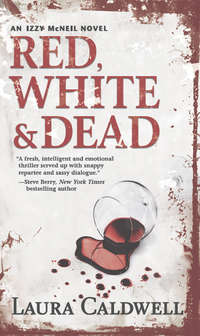
Полная версия
The Good Liar
“I believe this man had been asked to help the F.S.B. convince me. And this man had also been waiting for the right time to punish me for the article I’d written.”
He had a scar on his cheekbone, the only mark on his pale skin, and he rubbed at it with his forefinger.
“Did they do that to you?” Liza pointed at the scar.
He laughed. “No. My brother did this to me when I was six.” Then the laughter in his face died away, replaced by anguish. “My brother is a priest. My sisters are married. One has five kids, another four. My mother is…how do you say?…handicapped. My father takes care of her.”
“Ah,” Liza said, understanding now. “They threatened your family.”
“Yes.”
“They said they would kill them all unless you provided intelligence.”
“Yes.”
Liza reached out and touched his knee. He almost pulled away from her, she saw that. But then he simply met her gaze. “You’re terrible at it,” she said.
He laughed again, this time for a long time. A cleansing, relief-filled laugh. “I know! I told them I would be terrible. I have no mind for secrecy.”
“What happens if I don’t give you the rock? What happens if you don’t return it to them with photos?”
He stopped short. “Please don’t let me find out.”
“What is your name?”
He paused, then shrugged. “Aleksei Ivanov.”
Liza took the rock out of her jeans. She handed it to him. “I can help you, you know.”
“How? Who are you?”
She thought of the words she’d heard many times from the person who’d pulled her into this world. Her father. “I’m an American who loves my country,” she replied. It was a rather cheesy thing to say, but it was the truth. One of the only truths in her life.
“I cannot be seen with you,” he said. “I may have already risked my safety and my family’s by being here.”
“That’s not a problem,” Liza said. “I know how to keep a secret.”
12
Manhattan, New York
R oger Leiland stood in front of the floor-to-ceiling windows of his loft office on Fifteenth Street. In his hand was his secure phone, ready for the call he’d been waiting for all afternoon. The windows in front of him had been professionally coated with a darkening solution to prevent anyone from seeing inside his office, day or night, whether he had the lights on or not. And so he stood, legs apart, knowing he was invisible and dreaming of invincibility.
This was not the only unit Roger owned in the building. His home was an even bigger condo one floor down, filled with the trappings that would make most New Yorkers happy—incredible space, hardwood floors, exposed brick. When the upstairs unit had come up for sale seven years ago, Roger had purchased it. He was proud that he could afford it. He loved that, as a member of the Trust whose stock was rising, he no longer had to go into the New York office every day.
But desires, once met, tend to evolve and grow. And Roger had begun to believe that he wasn’t destined to be just a cog in the wheel of the Trust, but rather a driving force. He began to crave—in a hungry, insatiable, almost voracious way—wealth and greatness. His own personal brand of greatness.
As Roger watched the traffic stream by on Fifteenth Street, he wondered where those desires had come from. Raised in a suburb of Pittsburgh, with a teacher mother and a veterinarian father, his family was comfortable but not exactly ambitious. He went to Penn for undergrad, where he got a joint major in biology and Spanish. And when he was recruited for the Trust two years out of Penn medical school, he was thrilled. His surgical residency had made him question whether he really wanted to practice medicine. The malpractice premiums were going up and fellowships tougher to land than ever. There was too much gore and not enough upside.
In his early years with the Trust, it had never occurred to him that someday he might want to take over the organization, that someday he might want to take the group in a very different direction. He was in Brazil then, and he had Marta. But then Marta died. And that gave him an incredible toughness. The Trust had also given him confidence. Really, the Trust required confidence from its operatives in order to do their jobs. To compensate for the loss of Marta, he worked harder and harder. Eventually, over the years, which had taken him from Brazil to Chicago and then New York, his confidence grew to a point where he sensed he might assert his own vision, rather than that of his superiors.
And now, his loft office and his loft apartment no longer satisfied him. The view of the inelegant Fifteenth Street frustrated him. He wanted a palace with a rooftop garden and twenty-four-hour staff and mural-painted ceilings. He wanted a driver outside, always at the ready. He wanted two other homes—one mountainside in Aspen, one ocean-side in St. Barts. He wanted a private jet to take him to these homes, and he wanted to own that jet.
But the Trust, at least the way it had always been, was not going to bring him those things. And so Roger had been biding his time while his stock slowly rose. He’d helped spearhead the Juliet Project in Chicago, becoming an integral part of the process, and finally he’d become an integral part of the Trust. He cultivated relationships with members and contacts around the world, even when he didn’t need to do so for a particular mission. Now that he was a ranking board member, now that purist members like Michael were stepping down, and others had been helped in that direction, he was going to take the Trust toward his vision and his desires. The Juliet Project was just the beginning.
The phone rang. Roger glanced at the display, which scrambled incoming numbers according to a code developed by the Trust and further personalized by each individual member. It was the call he’d been waiting for.
He answered it with a polite, “Yes.”
“The apartment has been searched,” said a man’s voice.
Roger checked his watch. “It’s 11:00 p.m. there. What took so long?”
“A dinner party in the building. We wanted to make sure no one saw us entering.”
“And?”
“Nothing.”
“You’re certain?”
“Of course.”
“I want it cleaned out, just to be sure.”
“Not a problem. We’ll have it done within two hours.”
“Thank you.”
Roger turned, walked to his desk in the corner and hung up the phone. The desk was merely a maple table, minimally adorned with a few stacks of papers, all of which would be placed back in the safe when he was finished for the day. And then what would he do with his evening? he wondered. Maybe he would call one of the women he dated (and slept with) who knew little about him?
He had hoped the phone call would give him reason to celebrate. He hoped the evidence they were searching for would have been discovered in the apartment and that anything that could shed light on the Trust and its role in certain events would have been destroyed. Trust only worked if it worked in secret. That was true whether it operated his way or the way it had for decades. And so he would always protect the secrecy of the Trust. No matter what it took.
But there was no reason to celebrate right now. That would come. Roger walked around his desk, took a seat and continued working.
13
St. Marabel, Canada
“T ell me about the first boy you kissed.” Michael said as we strolled St. Marabel’s long main promenade on a Tuesday evening.
“What?” I punched him lightly on the arm. “You don’t want to hear about that.”
“I do. I want to know everything.” Michael tucked my other hand tighter into the crook of his arm, and I nuzzled against his shoulder, unbelievably content.
It was June, when the days were getting longer and the summer had only begun to show itself, just like my new life, my new marriage, my new home of St. Marabel. St. Marabel, so far, had not disappointed. I adored its main street with its steep mansard roofs and brightly painted shutters over dormered windows. I loved the bistros protected by striped awnings, the little boutiques that stayed open until eleven at night, the galeries d’art. I liked the sight of vacationers moving languidly from store to bistro and back again. I loved the sound of French being spoken around me, buffeting me.
“Michael, I can’t tell you about my first kiss,” I said. “That’s the kind of thing people tell each other when they’re dating, not when they’re married.”
He made a stern face. “What kind of ridiculous statement is that? And besides, I will always be dating you. ”
“We’re married.” I loved the sound of it.
“But still courting.” Michael steered me onto a side street that curved its way around an old stone building. The scent of chocolate and pastry permeated the air. “So tell me about the first boy you kissed.”
I inhaled deeply, breathing the scent of the pastries and the cool, earthy smell that came from the cobblestones. “Maybe my first kiss was with you.”
“You were married before, my dear.”
I waited for the pain in my abdomen that always came when I was reminded of my relationship with Scott. But it didn’t hit. Not even a pinch. “Just because I was married doesn’t mean I kissed him.” I said this teasingly and felt a burst of relief that I could make a joke about my first marriage.
“Hmm, excellent. So I’m the first.”
“Yes.”
“I like it,” Michael said.
Suddenly, there was a rapid staccato sound from somewhere up the alley.
Michael swung me around and shoved me hard against the side of the building.
“Ouch! Michael, what—”
“Get down,” he barked in a low but insistent tone.
I did as he said and dropped to a squat, my heart thumping fast.
Michael spun around and faced the alley, one arm reaching behind to protect me, the other reaching toward his waist.
Two teenage girls ran past, their high heels clicking on the stone. Michael sighed, heavy with exasperation.
“I’m sorry,” he said, turning to me. “Sorry. I got jumpy.”
“Jesus,” I said, standing up. “What was that about?”
He stared in the direction of the girls. He blinked fast. “Sorry.”
“Are you all right?”
“I’m fine.”
“What did you think was happening there?”
“I don’t know. I got startled, I guess.” He lowered his head to kiss my neck and then whisper in my ear. “So where were we?”
I pulled his face to mine, so I could see his expression. The calm demeanor he usually wore had returned. “You’re okay?”
“I’m with you, aren’t I?” He grabbed me around the waist and nuzzled my collarbone.
“Yes.”
“Then I’m good.”
I wrapped my arms around him. “You’re sure?”
“I’m fine,” he said, but under his shirt, I could feel his heart beating fast.
14
Anguilla, West Indies
L iza sat on her balcony at Cap Juluca resort. Below her, the white sand was combed smooth and the morning sun glittered like diamonds on the aqua of the Caribbean Sea. She turned her attention to the table in front of her. Like many vacationers at the resort, Liza’s table bore coffee, rolls and the mini version of the New York Times. But Liza was not a vacationer, and so she pushed away the rolls, took a sip of her black coffee and opened up the complete version of the Times on her BlackBerry.
It was hard to focus on the articles. Normally, when she was on a job like this, focus was never a problem. But now Aleksei was gone, and she hadn’t been able to find out a damn thing about the crash. The Trust, which knew all about her and Aleksei and also knew that she might be distracted by his death, had sent her on this mission to Anguilla. She’d been grateful, but now she was finding that she was the distraction.
Normally, Liza would conduct surveillance and collect intel, and if an elimination was necessary, and only then, would she design the job based on what she’d found. In this situation, she hadn’t performed the legwork, she’d just been asked to take care of the end result. The piecemeal approach was the way the Trust seemed to work these days, which made Liza uncomfortable. She liked to know everything about a project and a target. Today’s mission was a simple one, at least for her, but seemingly simple jobs could turn into chaos if the operative wasn’t completely attentive and alert.
So Liza tried to put aside thoughts of Aleksei and questions about his death. Later, she told herself. Later. Yet she found it impossible not to remember.
15
Five years earlier
Rio de Janeiro, Brazil
T he Trust called it a safe house, but really it was just a different apartment, bought the same way the place in Gávea across the street from Franco’s house had been purchased—quickly and with a lot of money. Similarly, the safe house had been stripped of the remnants of its previous owners, and then it had been decorated in what Liza liked to call Twentieth-Century Hotel. It was clean and decently appointed in lots of beige. Spending any amount of time there had always reminded Liza of the starkness in her life. But now Aleksei was with her. And the safe house seemed bursting with light and chock-full of something very new and very exciting.
It had been three days since she’d accosted the poor man and made him tell his story. After they’d left Rocinha, she’d placed the rock for him in a better spot, one which would catch the faces of those entering Franco’s house instead of their profiles. She had no interest in stopping the Russians from gaining information about Franco and Gustavo. The photos were easy, the kind of surveillance anyone could get, and Liza’s organization wouldn’t compete. They left other countries, other groups, to their own devices unless it appeared those countries or groups could compromise the United States and its citizens. Then they could get highly competitive. The results weren’t pretty, but they were necessary. That’s what Liza had always believed—would always have to believe if she were to keep her sanity.
One of the things Liza taught Aleksei was how to perform without emotion. It was never lost on her that she’d done the exact opposite when she’d met him. But she kept trying to teach him this nonetheless, because he also had to do his job without being particularly successful at it. He didn’t believe in what he was doing, not like Liza did, but for the safety of his friends and family he had to appear as if he cared very much. His handlers had instructed him in a rudimentary way on how to spot a tail and how to make a drop and various other tactics, but he was awful at them. Liza taught him the way she’d been taught.
They made sure it appeared as if Aleksei was living in the small hotel room where he’d been told to stay, and they made sure he checked in with his handler and turned over the photos that his sad little rock acquired every day. Once those things were done, no one seemed to care much about Aleksei. Except for Liza.
Every day, Liza conducted lessons with him, breaking the rules in a whopping way by letting him into the apartment in Gávea. She showed him the scopes and the listening devices and the alarms and bugs. She was reckless; she felt literally out of control. She had at first entertained the idea that Aleksei’s facade was just that—a facade—and that he might be a much better spy than she was, one who had quickly and easily wormed his way into her world.
And yet, for once, Liza trusted someone. She felt pulled toward him by an undercurrent she’d never seen coming and didn’t totally understand. She was attracted to him, but there was also something intangible that made her feel deeply connected to him. Throwing caution to the wind was intoxicating.
He never asked who she worked for, and she never told him. If an outsider learned about the Trust’s existence, there was a serious possibility that outsider would be eliminated. So Aleksei didn’t know her employer, but he knew everything else. She told him everything about her life, and she felt like he had grown to know all of her.
“You’re so lucky I’m teaching you all these things,” she said one night.
They were stationed in front of the window in Gávea, peering through night scopes at Franco’s front door and the one window that faced the street. Because of a party Franco was having, the window was open and the drapery pulled back.
Aleksei had been trying to quit smoking, he said, but Liza could smell the scent of a cigarette on his jacket. She hated cigarettes, and yet with him she didn’t mind. She even liked it. She liked everything about the man—his book-smarts, the way his thick hair was colicky and hard to tame, the way his green eyes filled with pain when he saw children barely clothed and nearly starving on the Rio streets.
“I am lucky,” he said, and then he was silent. His silences were different than that day in Rocinha. They were comfortable silences now.
“You probably would have been killed sooner rather than later if it wasn’t for me.” She had no idea why she was doing this bragging. “I could be killed for teaching you what I know.”
Aleksei remained quiet, then out of the corner of her eye, she saw him sit back from the scope. He gazed at his hands. He gazed at her.
In the moonlight filling the apartment, he appeared larger, the scar on his cheek almost white.
He moved toward her. It was a quick, clumsy rush of physical movement, and Liza almost blocked him. She could have easily defended herself if he were trying to harm her. But in a fraction of a second, in that moonlight, she caught the look in his eyes, and it was not the look she’d seen when she’d been attacked by someone before. This was a gentler look, and Liza thought, Is he going to kiss me? Then she thought, Finally.
Aleksei’s body met hers, his weight pushed her off her stool and the two of them tumbled to the hardwood floor. And then he was kissing her, and then his hands were on her shoulders, on her breasts, on her back, her waist. He was all over her. Liza felt enveloped by his eager touch. And she was happier than she ever remembered.
16
Anguilla, West Indies
L iza shook the thoughts of Aleksei from her brain. Enough, she said to herself. She checked her watch: 10:45 a.m. She looked at the villa to her right. She had fifteen minutes.
She stood, readjusted her black tank bathing suit and opened the straw bag on the chair next to her. She checked that the yellow tube that read Caprilano Sunscreen was tucked in the inside pocket.
Caprilano Sunscreen was sold only in two places—Barneys New York and a store in the Galleria Alberto Sordi in Rome. This tube, however, had not been purchased at either store. Instead, it was a replica. Likewise, the contents inside looked exactly like the white Caprilano sunblock and had been designed to bear its faint, citrusy scent.
Liza adjusted her earbud and put on her large, floppy beach hat. One side of the hat drooped almost to Liza’s jaw and had a tiny mike sewn into its cotton folds.
“Tucker,” she said into the mike. “Ready?”
“Confirmed,” came the reply in her earbud.
She went to the edge of her balcony and leaned over the railing. A hundred feet off shore, the multicolored sails of a Hobie Cat flapped prettily as it tacked back and forth across the water.
Liza called the front desk, gave the name Elena Mistow and checked out of her room over the phone. She asked for a bellman to collect her bags, which she put outside her front door, and requested that a cab be called. She left the room, walked downstairs and made her way to the beach’s edge.
Once there, she didn’t step into the sand immediately. Instead, she looked at the villa to her right. She glanced at her watch again. Any minute now. She waited patiently in her bathing suit, her straw bag in one hand, her hat firmly on her head, hiding her auburn hair. As she stood there, some of the resort’s guests began to filter down to the beach, throwing towels over the plush chaise longues and settling in with books or stacks of magazines.
Liza envied those people. She couldn’t remember the last time she’d gone on a real vacation or simply sat on a beach and read.
She turned her attention back to the villa. Five minutes later, she saw the French doors open and, as they had every morning for the last five days, the members of the Naponi family began to make their way to the beach. As usual, Angelo Naponi was the last to cross the threshold.
Angelo Naponi was the president of a wealthy family company that owned waste-disposal facilities around the world. Liza and the Trust had no problem with Naponi’s company and the work they did. What they had a problem with was how he spent some of his money. Lately, Naponi had been funding a militant Muslim organization that had its sights on a large-scale bombing in Vilnius, the capital of Lithuania. Naponi himself was Roman Catholic, and was unsympathetic to the Muslims, but such a bombing would wreak havoc in Vilnius where Naponi had been trying to get a foothold for years. Once such havoc occurred, outside companies, just like Naponi’s, would be called upon to help clear the wreckage.
Конец ознакомительного фрагмента.
Текст предоставлен ООО «ЛитРес».
Прочитайте эту книгу целиком, купив полную легальную версию на ЛитРес.
Безопасно оплатить книгу можно банковской картой Visa, MasterCard, Maestro, со счета мобильного телефона, с платежного терминала, в салоне МТС или Связной, через PayPal, WebMoney, Яндекс.Деньги, QIWI Кошелек, бонусными картами или другим удобным Вам способом.









